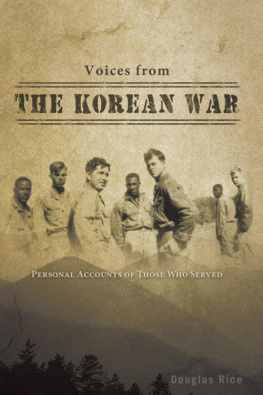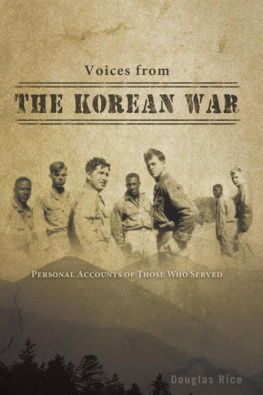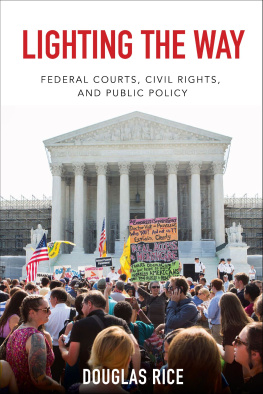Douglas Rice - Voices from the Korean War
Here you can read online Douglas Rice - Voices from the Korean War full text of the book (entire story) in english for free. Download pdf and epub, get meaning, cover and reviews about this ebook. year: 2011, publisher: iUniverse, genre: Non-fiction. Description of the work, (preface) as well as reviews are available. Best literature library LitArk.com created for fans of good reading and offers a wide selection of genres:
Romance novel
Science fiction
Adventure
Detective
Science
History
Home and family
Prose
Art
Politics
Computer
Non-fiction
Religion
Business
Children
Humor
Choose a favorite category and find really read worthwhile books. Enjoy immersion in the world of imagination, feel the emotions of the characters or learn something new for yourself, make an fascinating discovery.
- Book:Voices from the Korean War
- Author:
- Publisher:iUniverse
- Genre:
- Year:2011
- Rating:4 / 5
- Favourites:Add to favourites
- Your mark:
- 80
- 1
- 2
- 3
- 4
- 5
Voices from the Korean War: summary, description and annotation
We offer to read an annotation, description, summary or preface (depends on what the author of the book "Voices from the Korean War" wrote himself). If you haven't found the necessary information about the book — write in the comments, we will try to find it.
Voices from the Korean War — read online for free the complete book (whole text) full work
Below is the text of the book, divided by pages. System saving the place of the last page read, allows you to conveniently read the book "Voices from the Korean War" online for free, without having to search again every time where you left off. Put a bookmark, and you can go to the page where you finished reading at any time.
Font size:
Interval:
Bookmark:
Voices from the Korean War
Personal Accounts of Those Who Served
Douglas Rice
iUniverse, Inc.
Bloomington
Voices from the Korean War
Personal Accounts of Those Who Served
Copyright 2011 by Douglas Rice
All rights reserved. No part of this book may be used or reproduced by any means, graphic, electronic, or mechanical, including photocopying, recording, taping or by any information storage retrieval system without the written permission of the publisher except in the case of brief quotations embodied in critical articles and reviews.
iUniverse books may be ordered through booksellers or by contacting:
iUniverse
1663 Liberty Drive
Bloomington, IN 47403
www.iuniverse.com
1-800-Authors (1-800-288-4677)
Because of the dynamic nature of the Internet, any Web addresses or links contained in this book may have changed since publication and may no longer be valid. The views expressed in this work are solely those of the author and do not necessarily reflect the views of the publisher, and the publisher hereby disclaims any responsibility for them.
Any people depicted in stock imagery provided by Thinkstock are models, and such images are being used for illustrative purposes only.
Certain stock imagery Thinkstock.
ISBN: 978-1-4502-8256-7 (sc)
ISBN: 978-1-4502-8258-1 (dj)
ISBN: 978-1-4502-8257-4 (ebk)
Printed in the United States of America
iUniverse rev. date: 01/03/2011
Dedicated to:
My fatherDelbert Rice:
To the men and women who shared their experiences:
And, to the men who never returned home.
Yea, though, I walk through the valley of
the shadow of death, I will fear no evil;
for thou art with me...
Psalms 23:4 KJV
Contents
~~Introduction~~
I remember as a child listening to my father as he told about his experiences during the Korean War. Because of his experiences, I became interested in military history at an early age.
The only time I wore a military uniform was in Army ROTC my freshman year at Western Kentucky University. Unfortunately, meeting twice a week at 5:00 AM in the parking lot of Diddle Arena, to practice marching and Manual of Arms, does not make me an authority on the subject. However, during the six years, I have interviewed by mail, email, phone, and in person, over one-hundred individuals who are authorities on the subject. Veterans!
One day as my father and I were working in the garden, he told me that there is a special bond between soldiers. Being a pre-teen, I had no idea of what he was talking about. But, during these past six years, spending countless hours reading handwritten letters and numerous hours on the phone, I now have a better understanding.
The silence of night was broken by shrills from bugles and whistles as the enemy came swarming down on them. How they endured the extreme cold of a record breaking winter. In the summers there was the heat and monsoon season. There was the smell of human waste, which was used as fertilizer, that hung over the lands like a morning fog in the fall. They listened to the yells for medic and the screams for mother by a dying comrade. In their arms, a buddy took his last breath. Most of all, they knew at any minute they might have to lay down their own life to save the life of a fellow soldier.
The Korean War has been called a police action, a conflict, a war. Unfortunately, there is one label that haunts those who so gallantly served; it is the Forgotten War.
June 25, 2010, marked the 60th Anniversary of the beginning of the Korean War. There was no Steven Spielberg/Tom Hanks produced HBO series. There was no Ken Burns documentary on PBS. There was no official recognition in Washington, D.C..
Let it be known, these individuals fought just as bravely as any soldier in previous wars. They endured the same hardships. They bleed the same red blood. Over 36,000 of them died in a three year period. And most of all, 8,100 American soldiers are still missing; after sixty years.
I received a letter from Nola Eckhart, wife of Alfred Eckhart, saying even though Alfred suffers from Alzheimers; he still cannot forget the fighting and death toll on Porkchop Hill.
It is certain these men and women have not forgotten their war, and we as a free nation should not forget either.
Douglas Rice
BOOK I
June 1950 thru June 1951
~~One~~
George Weidensall
21st Infantry Regiment
24th Infantry Division
U.S. Army
In March of 1948, at the age of seventeen, I enlisted in the U.S. Army. After completing eight weeks of basic training at Fort Jackson, South Carolina, I was informed the camp was overcrowded and I would be receiving my Advanced Infantry training at my next duty stationAmerican controlled Korea.
While being processed upon my arrival, I was asked if I could type. Replying, Yes, they assigned me to the 6th Infantry Division Headquarters located in Pusan, where I was assigned the driver for the divisions chaplain. I stayed here until the American occupation ended nine months later.
From Korea, I transferred to Kokura, Japan, where I became the driver for the 24th Infantry Divisions chaplain. Eighteen months later I became the driver for the chaplain of the 21st Infantry Regiment. With only eleven days left of my service the unthinkable happened; North Korea had invaded South Korea. This prompted General MacArthur, Commander of Allied Forces in occupied Japan, to issue orders that the Army was extending the service of the men whose tenure was shortly to expire. I would not be going home; I would be going back to Korea.
Several days after the invasion, President Truman authorized MacArthur to send ground troops to Korea. Acting quickly, MacArthur instructed General Walker, Commander of the Eighth Army, to send the 24th Infantry Divisionone of the four divisions stationed in Japan. So, Task Force Smith, under the command of Lt. Colonel Charles Brad Smith, was assembled. With Smith being the CO of 1st Battalion, 21st Infantry Regiment, the task force was formed from Companies B and C, an artillery battery, a few doctors and medics; totaling 540 men, of whom 406 were infantry.
I was issued my first M-1 rifle since basic training, which had been red-tagged by ordinance as being unserviceable, and given 120 rounds of ammo. We soon boarded C-54s and were flown to Pusan during the evening of July 1st. Arriving in Pusan we traveled by train, and trucks, to Juk-Mi Ridgejust north of Osan; we arrived during the evening on the Fourth of July.
In the early morning hours of the fifth, we would be the first U.S. troops involved in combat in the Korean War. We were met by the NKPA, which numbered in the tens-of-thousands, and thirty-three Russian built T-34 tanks. Being outnumbered, and under-equipped, Lt. Colonel Smith ordered what was left of the task force to leave. We managed to hold the pass for seven-and-a-half hours, then we began to run out of ammunition and GIs; there were about 250 of us left. It was pretty much every man for himself, and we had no maps of compasses.
I eventually met up with about sixty other men. We moved along the roads during the nights, and in the hills during daylight. Finally, after two nights and one day, we met up with elements of the 34th Infantry Regiment. Having injured my back during this time I was sent to a hospital in Japan.
When I returned to my unit, the chaplains jeep had arrived from Japan. The chaplain had a Christian flag that he wanted to fly on the front of his jeep. However, this was at a time the NKPA was using the red crosses on helmets, and ambulances, as targets. So, refusing to fly his flag, I went to the CO requesting a transfer to a rifle companyI went to C Company. During the outbreak of the Pusan Perimeter, I crossed the Naktong River with the second platoon, second squad, who I stayed with until early 1951.
Next pageFont size:
Interval:
Bookmark:
Similar books «Voices from the Korean War»
Look at similar books to Voices from the Korean War. We have selected literature similar in name and meaning in the hope of providing readers with more options to find new, interesting, not yet read works.
Discussion, reviews of the book Voices from the Korean War and just readers' own opinions. Leave your comments, write what you think about the work, its meaning or the main characters. Specify what exactly you liked and what you didn't like, and why you think so.








